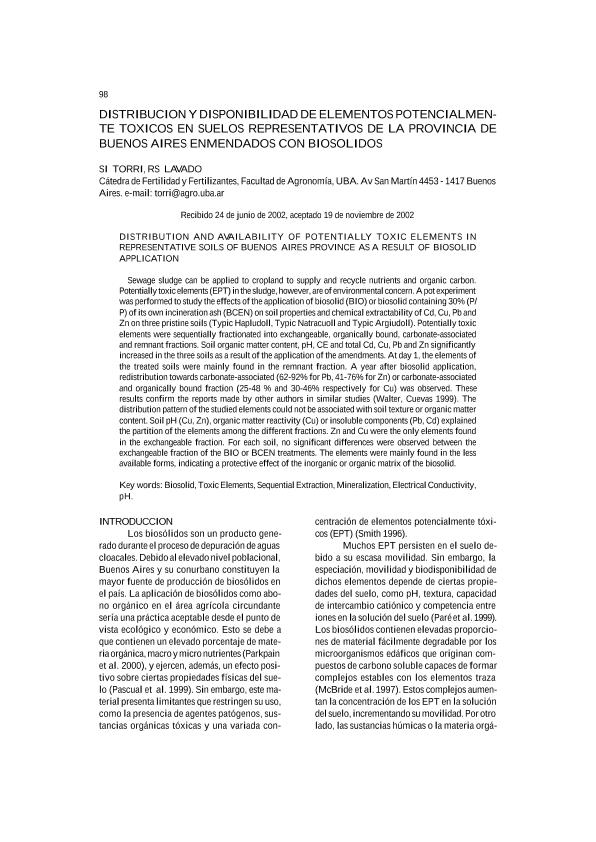Mostrar el registro sencillo del ítem
dc.contributor.author
Torri, Silvana Irene

dc.contributor.author
Lavado, Raul Silvio

dc.date.available
2018-09-07T20:02:52Z
dc.date.issued
2002-12
dc.identifier.citation
Torri, Silvana Irene; Lavado, Raul Silvio; Distribución y disponibilidad de elementos potencialmente tóxicos en suelos representativos de la Provincia de Buenos Aires enmendados con biosólidos; Asociación Argentina de la Ciencia del Suelo; Ciencia del Suelo; 20; 2; 12-2002; 98-109
dc.identifier.issn
0326-3169
dc.identifier.uri
http://hdl.handle.net/11336/58841
dc.description.abstract
Sewage sludge can be applied to cropland to supply and recycle nutrients and organic carbon. Potentially toxic elements (EPT) in the sludge, however, are of environmental concern. A pot experiment was performed to study the effects of the application of biosolid (BIO) or biosolid containing 30% (P/ P) of its own incineration ash (BCEN) on soil properties and chemical extractability of Cd, Cu, Pb and Zn on three pristine soils (Typic Hapludoll, Typic Natracuoll and Typic Argiudoll). Potentially toxic elements were sequentially fractionated into exchangeable, organically bound, carbonate-associated and remnant fractions. Soil organic matter content, pH, CE and total Cd, Cu, Pb and Zn significantly increased in the three soils as a result of the application of the amendments. At day 1, the elements of the treated soils were mainly found in the remnant fraction. A year after biosolid application, redistribution towards carbonate-associated (62-92% for Pb, 41-76% for Zn) or carbonate-associated and organically bound fraction (25-48 % and 30-46% respectively for Cu) was observed. These results confirm the reports made by other authors in similar studies (Walter, Cuevas 1999). The distribution pattern of the studied elements could not be associated with soil texture or organic matter content. Soil pH (Cu, Zn), organic matter reactivity (Cu) or insoluble components (Pb, Cd) explained the partition of the elements among the different fractions. Zn and Cu were the only elements found in the exchangeable fraction. For each soil, no significant differences were observed between the exchangeable fraction of the BIO or BCEN treatments. The elements were mainly found in the less available forms, indicating a protective effect of the inorganic or organic matrix of the biosolid.
dc.format
application/pdf
dc.language.iso
spa
dc.publisher
Asociación Argentina de la Ciencia del Suelo

dc.rights
info:eu-repo/semantics/openAccess
dc.rights.uri
https://creativecommons.org/licenses/by-nc-sa/2.5/ar/
dc.subject
Biosolid
dc.subject
Toxic Elements
dc.subject
Sequential Extraction
dc.subject
Mineralization
dc.subject
Electrical Conductivity
dc.subject
Ph
dc.subject.classification
Agricultura

dc.subject.classification
Agricultura, Silvicultura y Pesca

dc.subject.classification
CIENCIAS AGRÍCOLAS

dc.title
Distribución y disponibilidad de elementos potencialmente tóxicos en suelos representativos de la Provincia de Buenos Aires enmendados con biosólidos
dc.title
Distribution and availability of potentially toxic elements in representative soils of Buenos Aires Province as a result of biosolid application
dc.type
info:eu-repo/semantics/article
dc.type
info:ar-repo/semantics/artículo
dc.type
info:eu-repo/semantics/publishedVersion
dc.date.updated
2018-08-30T16:22:55Z
dc.journal.volume
20
dc.journal.number
2
dc.journal.pagination
98-109
dc.journal.pais
Argentina

dc.journal.ciudad
Buenos Aires
dc.description.fil
Fil: Torri, Silvana Irene. Universidad de Buenos Aires. Facultad de Agronomía; Argentina
dc.description.fil
Fil: Lavado, Raul Silvio. Consejo Nacional de Investigaciones Científicas y Técnicas. Oficina de Coordinación Administrativa Parque Centenario. Instituto de Investigaciones en Biociencias Agrícolas y Ambientales. Universidad de Buenos Aires. Facultad de Agronomía. Instituto de Investigaciones en Biociencias Agrícolas y Ambientales; Argentina
dc.journal.title
Ciencia del Suelo

dc.relation.alternativeid
info:eu-repo/semantics/altIdentifier/url/https://www.suelos.org.ar/publicaciones/vol_20n2/torri_98-109.pdf
Archivos asociados
